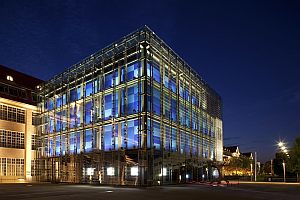The ZKM I Karlsruhe Center for Art and Media Technology presents the “Zuse Z22“, series number 13, the oldest, still functioning tube computer in the world, which is still true to the original. Its developer, the informatics pioneer Konrad Zuse, would have celebrated his 100th birthday this year. The KIT Department of Informatics and the ZKM I Center for Art and Media Technology will use this as an occasion to cover the “Fascination Informatics” by an exhibition and accompanying presentations on October 03 from 11 to 18 hrs. The event will focus on the use of computer technologies in everyday life.
The fascination of informatics lies in its width and versatility. Informatics is everywhere and no industry, no science can do without it. With the help of informatics, music is transmitted to the mobile phone, money is received from the cash terminal, information is obtained from the internet, airplanes reach their destinations, radiographs are displayed on the screen of the physician, robots are developed for industry, chances of scoring a goal are calculated, and music is downloaded. The versatility of this discipline will be demonstrated by the KIT Department of Informatics on the family day at ZKM.
At an exhibition on the ZKM_Museumsbalkon, computer scientists will present the projects on which they are working. Among others, they focus on modern route planning methods, carbon dioxide-reduced electromobility, the development of computer games, or the safe encoding of data. The humanoid service robot ARMAR III will demonstrate how intelligent technologies might support humans in the future everyday life.
At the ZKM_Medientheater, Professor Horst Zuse will present the works of his father Konrad Zuse by many photos and videos from the fifties. Another presentation will concentrate on the omnipresence of computer graphics in our life. Examples will be used to explain the complex calculations behind the images of films or computer games that can hardly be distinguished from reality any longer. Apart from these events for adults, two presentations conceived for the KIT children’s university will address children.
The development of computer technology that started with Konrad Zuse will be the subject of the tours guided by the Karlsruhe professor of informatics, Wolfgang Karl, who initiated the cooperation with ZKM as the chairman of the Konrad Zuse Society. “In 1941, Konrad Zuse was the first to operate in an ingenious way a program-controlled digital computing machine with the features of a computer we know today. With this, he marked the beginning of an epoch-making development,” says Karl. “Within the framework of the family day, we do not only want to look back on the origin of the computer, but concentrate on the presence and future of informatics.”
Fascination Informatics –On the Occasion of the 100th Birthday of Konrad Zuse
Within the framework of the family day “We are Family!“ at ZKM | Karlsruhe, on October 3, 2010, 11 to 18 hrs
Program
Presentations at the ZKM_Medientheater
14.00 hrs KIT Children’s University: Learning from Nature
for children aged 8 to 12, Dr. Sanaz Mostaghim
15.00 hrs KIT Children’s University: How Dinosaurs Learn to Walk Again and Other Secrets in the Computer
Computer, for children aged 8 - 12,
Prof. Dr. Ralf Reussner
16.00 hrs The Origin of the Computer
Prof. Dr. Horst Zuse
17.00 hrs Computer Graphics? Everywhere!
Prof. Dr. Carsten Dachsbacher
Exhibition on the ZKM_Museumsbalkon
from 11.00 to 18.00 hrs
- MeregioMobil – Energy concepts for the future
- The quickest way from A to B: Route planners
- SESAME-cadabra! Generating electricity and concluding contracts in a model city
- The humanoid robot “ARMAR III“
- One of us? – A cryptographic game, film
- Homo Ludens – The playing human
Tours
Development of Computer Technology
Prof. Dr. Wolfgang Karl
Tours at um 11.30 hrs, 12.30 hrs, and 13.30 hrs
Meeting point and registration at the tour office in the ZKM entrance hall
Being “The Research University in the Helmholtz Association”, KIT creates and imparts knowledge for the society and the environment. It is the objective to make significant contributions to the global challenges in the fields of energy, mobility, and information. For this, about 10,000 employees cooperate in a broad range of disciplines in natural sciences, engineering sciences, economics, and the humanities and social sciences. KIT prepares its 22,800 students for responsible tasks in society, industry, and science by offering research-based study programs. Innovation efforts at KIT build a bridge between important scientific findings and their application for the benefit of society, economic prosperity, and the preservation of our natural basis of life. KIT is one of the German universities of excellence.

